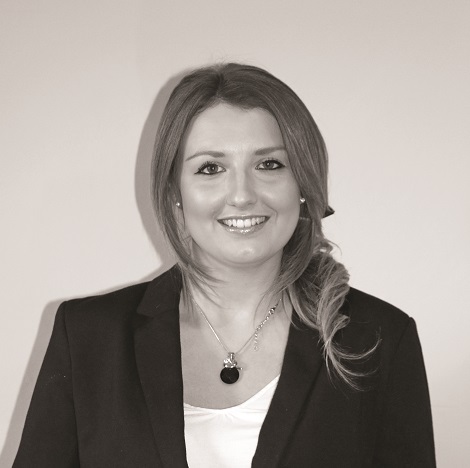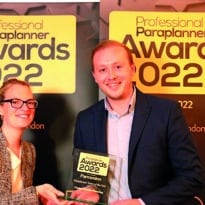Christina Melling moved home, leaving behind a legal job and her family to become a trainee paraplanner with Clarion Wealth Planning. Rob Kingsbury talked to her about her decision, what her role entails and her ambitions.
When Christina Melling moved from Bolton in Lancashire to Knutsford, Cheshire, to become a trainee paraplanner with Clarion Wealth Planning, it was not done on a whim. She left behind her family, friends and also three-and-a half-years of working for respected legal firm Keoghs in order to make the move.
“I really did my research on financial planning and on Clarion before I decided to make that commitment,” Christina says. “I knew that working in financial planning was what I wanted to do and I knew that Clarion had one of the best reputations as a company within the financial planning profession.”
She approached Clarion director Steven Walker via LinkedIn, initially for an administrator role. He had challenged her on the daily commute. “I looked into it and I went back and said I wanted to work for Clarion and I was willing to move in order to get the job.”
With her background in Law, Clarion quickly came to the decision that both Christina and the firm would be better served if she became a trainee paraplanner. She is now eight months into a three-year trainee programme, although she is hoping through hard work and dedication to cut that down to two and a half years. She is due to take the RO1-3 exams before the end of the year, quickly followed by J02. “I want to go all the way with qualifications and get as many of them done as soon as possible,” she says.
It is all part of a structured training schedule developed by head of paraplanning at Clarion, Adam Wareing (IFP Paraplanner of the Year 2015 and our paraplanner profile in the November 2015 issue).
The obvious question to ask is why, after six years of study and three-and-a-half years working within the legal profession – she had worked for Keoghs first as a Paralegal and then as a Fee Earner in the commercial litigation department – she decided to change, not just her career path, but also her profession.
The answer is a relatively simple one, she says: “Although I’d originally wanted to pursue a career in Law with the idea to be a barrister eventually, I found that while I enjoyed dealing with the technical aspects of the law, I couldn’t see it being the career for me long term. During my degree I had really liked the tax equity and trusts side of the course, and I found that in the legal profession you tend to deal with clients for a short period and then you don’t see them again. So I looked for a role where I could develop my interest in finance and where there was a better relationship with clients.”
Christina felt that a move into financial planning would be a natural progression, and a career where her experience of working in a legal firm, “being able to deal properly and professionally with clients” as well as being able to interpret changes in the law would stand her in good stead.
Also, the work of a paralegal is similar to that of a paraplanner, she says. “As a paralegal I’d be drafting reports and strategies for settling cases in personal injury claims, for example, assessing where the lower and upper limits of a personal injury claim should be valued, assessing the medical evidence and witness statements, how the injury has affected someone’s life and so on.”
“And that element of financial planning, developing the long-term relationship that can be built up and the privilege of having clients trust you to deal with elements of their lives that they have taken years to create, was one of the things that I stressed attracted me to financial planning in my interviews with Clarion.”
Trainee programme
The three-year trainee programme run by Clarion uses a mix of on the job training as well as attendance at conferences and on provider webinars to give trainees as wide a relevant education as possible.
“Adam has developed a really structured programme, which includes regular training on software such as FE Analytics and Truth cashflow modeling from Prestwood Software, webinars, and training that he conducts around drafting suitability reports and other parts of paraplanning. Also, we go to conferences – such as the CISI Paraplanning conference.
“I do feel that I hit the ground running and that I’ve learned a heck of a lot so far,” Christina says.
“My plan initially was to get settled in the day job and to get my head around what goes on, what the processes are, what clients typically ring about, and get myself into a position where I am able to deal with general day-to-day things.
“After eight months, I’m now at the point where I’m doing reports on analytics I’m doing research and dealing with clients comfortably.
Christina says she likes the on the job, get on and do it, nature of the training. “Now I’m pretty much left to get on with the job without supervision. I’ll take instructions from the directors around things like ‘Bed and ISAs’ at the end of the tax year, for example.”
Ambitions
For someone committed enough to change jobs and move to a new area to get the job she wanted, it is not surprising to learn that she has forward looking plans and ambitions. Looking 9 or 10 years ahead, Christina’s ambitions are to be fully qualified (as already intimated taking the exams sooner rather than later), and gaining as much experience and knowledge as possible that she could make the move into an advisory role in the long run.
“I am client-orientated and while I love doing the technical, research and supportive aspects of the job, I love liaising with clients and I would love to be able to do that face-to-face. But that is some way down the line and for now what I want to be is an amazing paraplanner and in time follow in Adam’s footsteps and become Paraplanner of the Year.”
Why be a paraplanner?
Eight months in to her training, asked what’s the best bit about the role, to date, she says: “It’s working with people who are so passionate about what they do – especially Ron and Steven Walker – and seeing the kind of relationship that a good financial planner can build with their clients.
“I love coming into work every day and being in a team that is so tight and that works so well together.”
So would she recommend paraplanning as a career choice to other people wanting similar challenges and rewards?
“I’d definitely recommend someone becomes a paraplanner because it’s a thriving role within a thriving industry. It’s challenging and rewarding, it’s technical, it’s everything you want from a good career. You have to be able to think on your feet and adapt to changes. Sometimes it’s fast paced and sometimes it’s more relaxed. It’s dynamic – that’s why I like it.”
What’s a typical day for Christina?
Christina works for Clarion director Steven Walker, alongside another paraplanner.
She says: “I’ll usually get in early to the office because I know that Steven will have sent me five or six emails from the night before.
“I’ll take instruction directly from Steven and he also does some of my training as well.
“I am responsible for his diary management so I will schedule his annual review meetings with clients. Then I’ll ensure all the pre- meeting documents have been sent out to the clients. This will include a net worth statement, for which I will have to go out to all the relevant providers for the data we need to update all the figures. I’ll also go to the client to obtain the figures that we don’t have the authority for, as well as draft the letters of authority, which will allow us to approach other providers for updates. Then I’ll make sure the system is fully updated for when the client comes in. It can be quite a long process.”
A typical day, she says, might also include preparing all the documents to allow for pension consolidation and at point of transfer ensuring the pension transfer value matches the value in the suitability report and notifying the client when each pension has been transferred.
“Also, I’ll use FE Analytics to research funds, for example where a client is using a bond and wants to change the underlying investments. I will do the research on the alternative investments available, matching them to the client’s risk profile.”
Overall, she adds, “I’ll try to make Steven’s life as easy as possible. So I’ll take on as much of the administration work as possible, I’ll do the product valuations, comparing annuity quotes and term assurance quotes, and so on and devise comparison table to make it simple and quick to use.”
While at current stage in her training Christina is not drafting suitability reports as yet, “I will be doing so in the near future. I do make reference to them within other work I’m doing and I’m getting training on writing reports from Adam,” she says.
As might be expected, given the reasons for her career change, Christina has a lot of contact with clients. “I’m talking to clients regularly and what’s nice is that I’ve already built up quite a good relationship with a handful of them. Some of them have been with us for years and they are lovely.”
Occasionally, Christina will write a blog for the company website. The last one was entitled How to help a younger relative onto the housing ladder while reducing your taxable estate and she will shortly be writing another on the Lifetime ISA vs Help to Buy ISA.
She concludes: “It was always important to me to make sure that when I started working at Clarion that I wasn’t seen as just the new girl but rather I was seen as a professional person coming to firm with a view to fitting in and having the same work ethic as Ron and Steven and the other members of the team.”





























